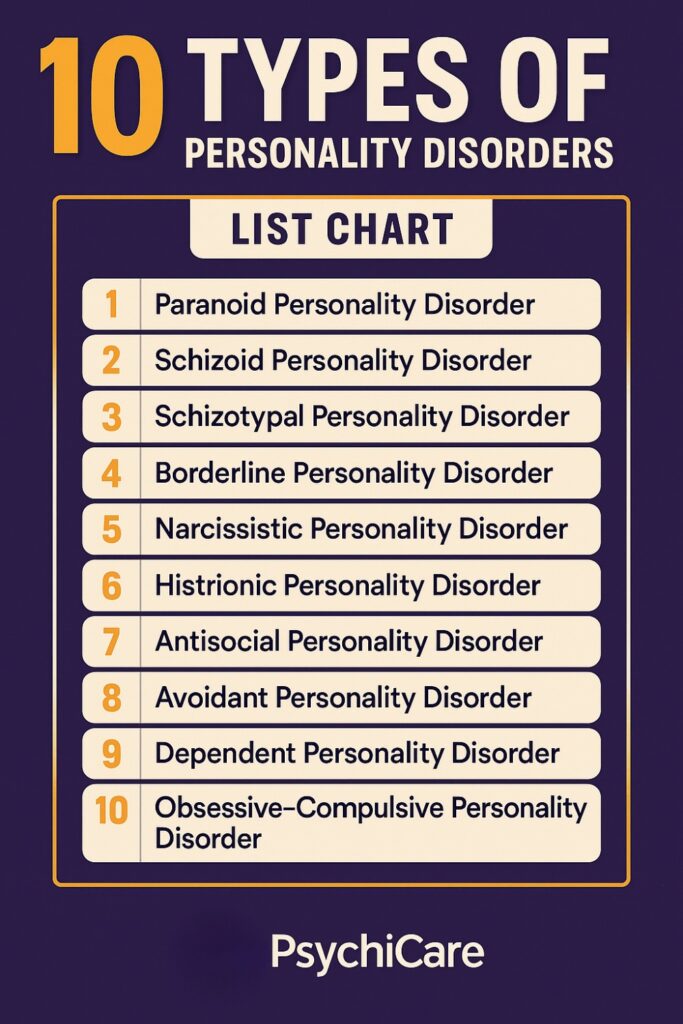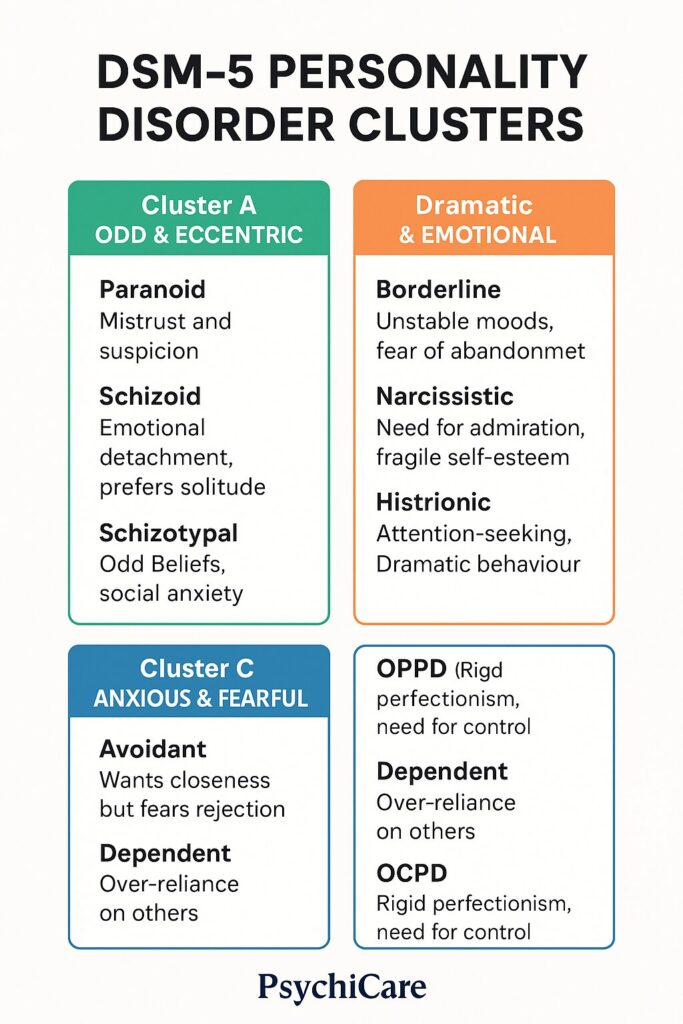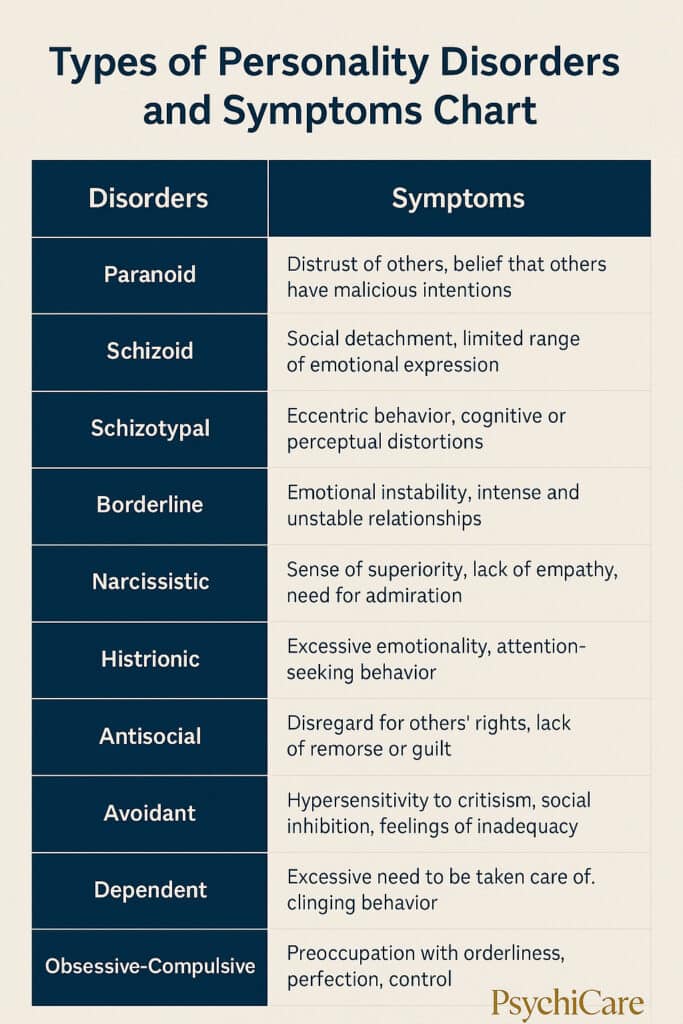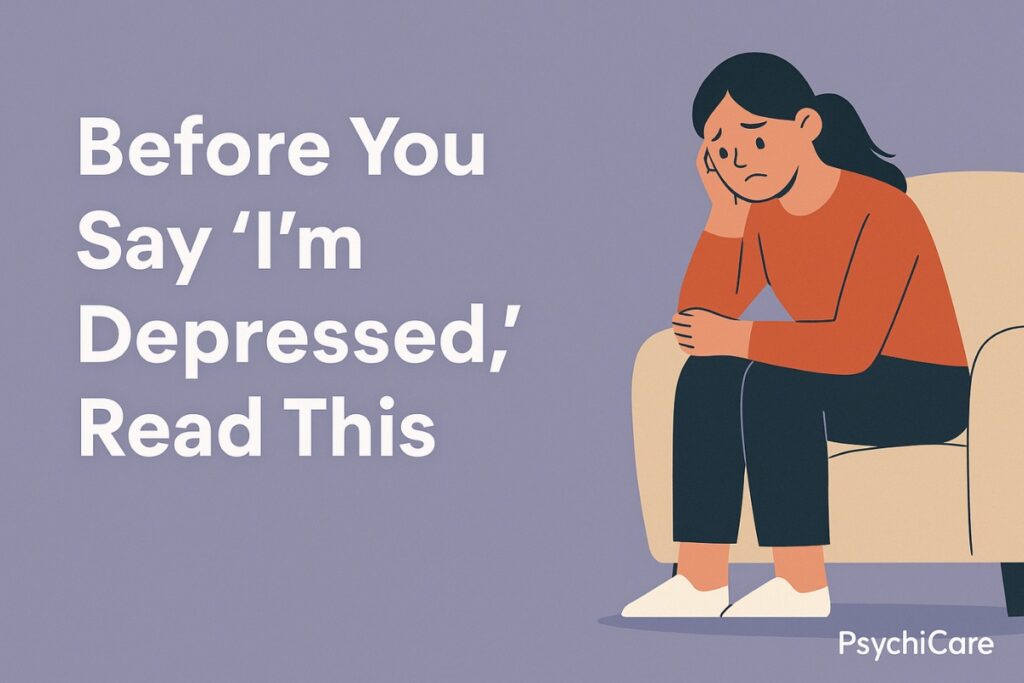Updated: October 2025 · Reviewed and updated to improve guidance and relevance.
When we talk about personality disorders, we’re not talking about everyday quirks. We’re talking about patterns of thinking and behaving that stick around for years and often make life harder than it has to be.
Clinicians usually describe 10 personality disorders, grouped into three clusters in the DSM-5:
- Cluster A: odd or eccentric
- Cluster B: dramatic or emotional
- Cluster C: anxious or fearfu
Each cluster has its own traits, and some can overlap. Understanding these types doesn’t mean labelling people, it means having language for patterns that might otherwise feel confusing. In this guide, I’ll take you through the different types, their common symptoms and causes, and why it matters to notice them.
What are personality disorders?
A personality disorder is not simply having strong opinions or unusual habits. It’s a long-standing pattern of thinking, feeling, and behaving that tends to show up across many situations and makes life harder than it needs to be. These patterns usually begin in the teenage years or early adulthood and remain fairly stable over time.
The DSM-5 and DSM-5-TR define a personality disorder as a pattern that differs noticeably from cultural expectations in at least two of these areas:
- How a person sees themselves and others
- How they manage emotions
- How they relate to people
- How they control their behaviour
For a diagnosis, the pattern has to be consistent, inflexible, and cause real distress or problems in daily life.
What’s changed in recent years is how we think about these conditions. The traditional DSM approach is categorical: you either “have” borderline personality disorder, for example, or you don’t. But research suggests that personality traits exist on a spectrum, from healthy to more extreme.
To reflect this, the DSM-5 introduced an Alternative Model in its later section, and the ICD-11 has moved even further by treating personality disorder as one condition with different levels of severity and trait markers.
This shift matters because it reduces stigma and recognises that personality difficulties aren’t always all-or-nothing. They can range from mild patterns that cause some friction to severe forms that deeply affect a person’s relationships, work, and sense of self.
The 10 types of personality disorders
The DSM-5 recognises 10 specific personality disorders. Each has its own traits, but they often overlap and may vary in severity. Here’s a clear overview of each type.
Paranoid Personality Disorder
This disorder is defined by deep mistrust and suspicion of others. Even neutral or kind actions may be misinterpreted as harmful. Relationships are often difficult because trust rarely feels safe.
- Believes others are deceiving or plotting against them
- Reads hidden meaning into harmless remarks
- Holds grudges for long periods
- Reluctant to confide in others
Schizoid Personality Disorder
People with schizoid personality disorder show little interest in forming close relationships. They prefer solitude and appear emotionally flat or detached. Unlike introverts, they actively avoid connection rather than simply needing time alone.
- Chooses solitary activities
- Limited interest in friendships or romance
- Rarely expresses strong emotions
- Seem indifferent to praise or criticism
Schizotypal Personality Disorder
This type blends social anxiety with odd or eccentric behaviour. People may hold unusual beliefs, dress in unconventional ways, or feel that events carry special hidden meaning. Though related to psychotic disorders, they usually remain in touch with reality.
- Unusual thinking or superstitions
- Odd speech, dress, or mannerisms
- Strong social anxiety, even with familiar people
- Suspicious or paranoid ideas
Borderline Personality Disorder
Borderline personality disorder involves unstable moods, relationships, and self-image. People often fear abandonment and may react with intense emotions or impulsive actions. Self-harm and suicidal thoughts are more common here than in other types.
- Fear of rejection or abandonment
- Rapid mood swings and emotional intensity
- Impulsive actions like reckless spending or unsafe sex
- Patterns of unstable but intense relationships
Narcissistic Personality Disorder
This disorder centres on an inflated sense of importance combined with fragile self-esteem. People may appear confident or arrogant, but criticism can quickly trigger anger or withdrawal. Empathy for others is often limited, which strains relationships.
- Expects admiration and recognition
- Difficulty recognising others’ needs
- Easily hurt by criticism
- Can seem boastful or self-centred
Histrionic Personality Disorder
Histrionic personality disorder is marked by dramatic, attention-seeking behaviour. People often rely on appearance, charm, or exaggerated emotions to stay at the centre of focus. Underneath, self-worth may feel unstable.
- Needs constant approval and attention
- Emotions shift quickly and may seem shallow
- Uses appearance or behaviour to attract notice
- Struggles with deep, stable relationships
Antisocial Personality Disorder
This type involves persistent disregard for rules and the rights of others. People may lie, manipulate, or act aggressively without remorse. The pattern usually starts in adolescence and continues into adulthood.
- Repeatedly breaks rules or laws
- Deceptive, manipulative, or aggressive
- Little sense of guilt or responsibility
- Ignores safety of self or others
Avoidant Personality Disorder
Avoidant personality disorder combines strong social anxiety with fear of rejection. People often want closeness but avoid it because they expect humiliation or criticism. Over time, this can lead to isolation and low confidence.
- Feels inadequate or socially inferior
- Very sensitive to criticism
- Avoids relationships despite wanting them
- Hesitant to try new activities
Dependent Personality Disorder
This type is defined by excessive reliance on others for guidance and decision-making. People may feel helpless when alone and struggle to assert themselves. Fear of being abandoned can keep them stuck in unhealthy relationships.
- Needs reassurance for everyday choices
- Avoids responsibilities or independence
- Clings to relationships, even when harmful
- Feels helpless or anxious when alone
Obsessive-Compulsive Personality Disorder (OCPD)
OCPD focuses on control, order, and perfectionism. Unlike OCD, it’s not about intrusive thoughts but about rigid rules and high standards for oneself and others. Work or routines often take priority over flexibility and relationships.
- Preoccupied with rules, details, and order
- Rigid standards for self and others
- Difficulty delegating or compromising
- Struggles to relax or prioritise fun

Personality disorders clusters (A, B, C)
To make the 10 types easier to understand, the DSM-5 groups them into three clusters. Each cluster reflects a shared style of thinking, emotions, and behaviour.
Cluster A: Odd & Eccentric (Paranoid, Schizoid, Schizotypal)
Cluster A personality disorders are marked by unusual thoughts, social withdrawal, or eccentric behaviour. People in this group often seem detached or suspicious, and relationships may feel distant or strained.
- Paranoid: mistrust and constant suspicion
- Schizoid: prefers solitude, little interest in closeness
- Schizotypal: eccentric beliefs, odd behaviour, social anxiety
- Often described as the “weird” or unusual cluster
Cluster B: Dramatic & Emotional (Borderline, Narcissistic, Histrionic, Antisocial)
Cluster B personality disorders involve intense emotions, impulsivity, and difficulties in relationships. People in this group may appear dramatic, unpredictable, or self-focused.
- Borderline: unstable moods and fear of abandonment
- Narcissistic: inflated self-image, fragile self-esteem
- Histrionic: attention-seeking and dramatic behaviour
- Antisocial: disregard for rules, lack of empathy or guilt
Cluster C: Anxious & Fearful (Avoidant, Dependent, OCPD)
Cluster C personality disorders revolve around anxiety, fear, and the need for control or reassurance. Relationships may be shaped by avoidance, dependence, or perfectionism.
- Avoidant: wants closeness but fears rejection
- Dependent: relies heavily on others for decisions
- Obsessive-Compulsive (OCPD): rigid, perfectionistic, controlling
- Often described as the “worried” or cautious cluster

Symptoms of personality disorders
The signs of personality disorders can vary, but they usually involve patterns of thoughts and behaviours that cause problems in everyday life. These patterns are long-term, show up in different situations, and feel hard to change.
Common symptoms across personality disorders
- Trouble managing emotions in a stable way
- Unusual or rigid ways of thinking about self and others
- Ongoing difficulties in relationships (conflict, mistrust, avoidance, or dependency)
- Impulsive or self-defeating behaviour
- Patterns that begin in adolescence or early adulthood and continue over time
Significant distress or problems at work, school, or home
Personality disorders symptoms by cluster
| Cluster | Main theme | Examples of symptoms | Disorders included |
| Cluster A (Odd & Eccentric) | Suspicion, detachment, unusual thinking | Distrust, social withdrawal, eccentric beliefs | Paranoid, Schizoid, Schizotypal |
| Cluster B (Dramatic & Emotional) | Intense emotions, impulsivity, unstable relationships | Mood swings, attention-seeking, manipulation, lack of empathy | Borderline, Narcissistic, Histrionic, Antisocial |
| Cluster C (Anxious & Fearful) | Anxiety, fear, need for control or support | Avoidance of social contact, over-dependence, perfectionism | Avoidant, Dependent, Obsessive-Compulsive (OCPD) |

Causes of personality disorders (genetic, trauma, environment)
There isn’t one single cause of personality disorders. Instead, they develop from a mix of influences that shape the way someone sees themselves and others. Most researchers agree it’s a combination of biology, life experiences, and environment.
Genetic factors
- Studies show that personality disorders can run in families.
- Certain inherited traits, like temperament or sensitivity to stress, may increase risk.
- Genes don’t determine destiny, but they can make someone more vulnerable when combined with other stressors.
Trauma and early experiences
- Childhood abuse, neglect, or inconsistent caregiving are strongly linked with later personality difficulties.
- Experiences of abandonment or unstable attachments can make it harder to build trust and regulate emotions.
- Traumatic events don’t cause personality disorders on their own, but they can trigger patterns that persist into adulthood.
Environmental and social influences
- Growing up in a chaotic, critical, or unpredictable environment can reinforce unhelpful coping styles.
- Cultural pressures and social factors, such as isolation or lack of support, may worsen existing traits.
- Ongoing stress in adulthood, like toxic relationships or work instability, can amplify symptoms.
How many types of personality disorders are there?
In the DSM-5, there are 10 recognised types of personality disorders. They are grouped into three clusters:
- Cluster A (odd or eccentric): paranoid, schizoid, schizotypal
- Cluster B (dramatic or emotional): borderline, narcissistic, histrionic, antisocial
- Cluster C (anxious or fearful): avoidant, dependent, obsessive-compulsive (OCPD)
That’s the official list, but you may see other numbers in textbooks, lectures, or online guides. Some simplify the categories into:
- 3 types, based only on the clusters (A, B, and C)
- 4 or 5 types, when grouping by themes such as “suspicious,” “emotional,” “anxious,” and “perfectionistic”
- 7 types, which is a common way educators bundle certain overlapping disorders together
So while the DSM-5 is clear about 10 specific disorders, the number can look different depending on whether the focus is on clusters, traits, or teaching models.
Therapy used for personality disorders
Personality disorders can feel overwhelming, but treatment is possible. The main approach is psychotherapy, with different methods tailored to each person’s needs.
Dialectical Behaviour Therapy (DBT): often used for borderline personality disorder; teaches emotion regulation, coping, and relationship skills.
Cognitive Behavioural Therapy (CBT): helps challenge rigid patterns of thought and behaviour, useful across many personality disorders.
Schema Therapy: focuses on breaking long-standing, unhelpful life patterns developed in childhood.
Mentalisation-Based Therapy (MBT): builds the ability to understand one’s own thoughts and feelings, and those of others, which helps in relationships.
Group Therapy: provides safe practice for social skills and helps reduce isolation.
Medication: not a cure, but can reduce symptoms like depression, anxiety, or impulsivity that occur alongside a personality disorder.
Progress takes time, but many people notice real improvements with the right support.
Conclusion
Personality disorders are not flaws in character. They are long-term patterns of thinking and behaviour that can cause pain, but they can also be understood and treated. The DSM-5 outlines 10 types, grouped into clusters A, B, and C, but modern approaches also see them as traits along a spectrum.
Recognising these patterns is the first step. With the right therapy and support, people can learn healthier ways of relating to themselves and others. If you or someone close to you recognises these signs, reaching out for professional help can make life feel lighter, more stable, and more connected.
At PsychiCare, our therapists provide and evidence-based treatment for personality difficulties and related challenges. Support is available; you don’t have to face these patterns alone.
FAQs
What are the 10 types of personality disorders?
The DSM-5 lists ten types: paranoid, schizoid, schizotypal, borderline, narcissistic, histrionic, antisocial, avoidant, dependent, and obsessive-compulsive personality disorder (OCPD). They are grouped into clusters A, B, and C based on shared traits.
What are the 3 main types of personality disorders?
When simplified into clusters, the three main types are: Cluster A (odd or eccentric), Cluster B (dramatic or emotional), and Cluster C (anxious or fearful). Each cluster contains several disorders with overlapping themes.
What are the 4 types of personality disorders?
Some educational sources group them into four broad styles: suspicious, emotional and impulsive, anxious and fearful, and perfectionistic. This is a teaching model, not the official DSM-5 classification.
What are the 7 types of personality disorders?
In some textbooks or lectures, the disorders are condensed into seven categories by combining similar ones. This variation is for learning purposes, while the DSM-5 formally recognises ten.
What are the symptoms of personality disorders?
Symptoms include rigid and long-lasting patterns of thinking, feeling, and behaving that cause problems in relationships, work, and self-image. Common signs are emotional instability, mistrust, avoidance, dependency, impulsivity, or perfectionism, depending on the type.
Are personality disorders treatable?
Yes, personality disorders can be treated. Psychotherapy is the main approach, with methods like dialectical behaviour therapy (DBT), schema therapy, and cognitive-behavioural therapy (CBT). Medication may help with symptoms like anxiety or depression, and many people improve over time with support.




